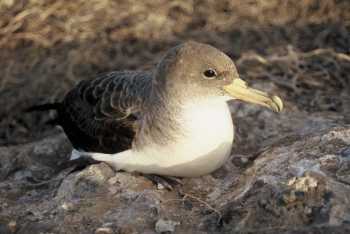The Portuguese Macaronesian Islands (Azores and Madeira) are vital breeding areas for several species of seabirds, including 85% of the world population of Cory’s Shearwater Calonectris borealis.

Cory's Shearwater ashore, photograph by Paulo Catry
On the Portuguese Azores’ smallest island, Corvo, the LIFE project Safe Islands for Seabirds has evaluated the impact of invasive rodents, feral cats, goats and sheep on Cory’s Shearwater (85% of the species’ population breeds on the Azores and Madeira Archipelagos).
This project found that cats caused the most harm, destroying 84% of all nests and eggs damaged by predators. Habitat restoration and the construction of Europe’s first predator-proof fence were among the measures used to mitigate the impact on seabirds.
Light pollution – a major threat to juvenile seabirds – is an issue where SPEA (BirdLife in Portugal) is taking action in Macaronesia. Over the last 20 years in the Azores and five years in Madeira a campaign involving volunteers, local organisations, city halls and SPEA has helped regional governments rescue and release thousands of Cory’s Shearwater juveniles impacted by artificial lights.
Both of Portuguese Madeira’s threatened petrels, the Endangered Zino’s Petrel Pterodroma madeira and the Vulnerable Desertas Petrel P. deserta, have been a top priority for SPEA (in collaboration with the Madeira Natural Park). SPEA has been working to control or eradicate invasive species such as cats, rabbits and mice, which efforts have contributed to the recovery of the two petrels.
SPEA has also published an inventory of its marine IBA (important Bird Area) network (click here).
Read more here.
John Cooper, ACAP Information Officer, 22 October 2015

 English
English  Français
Français  Español
Español